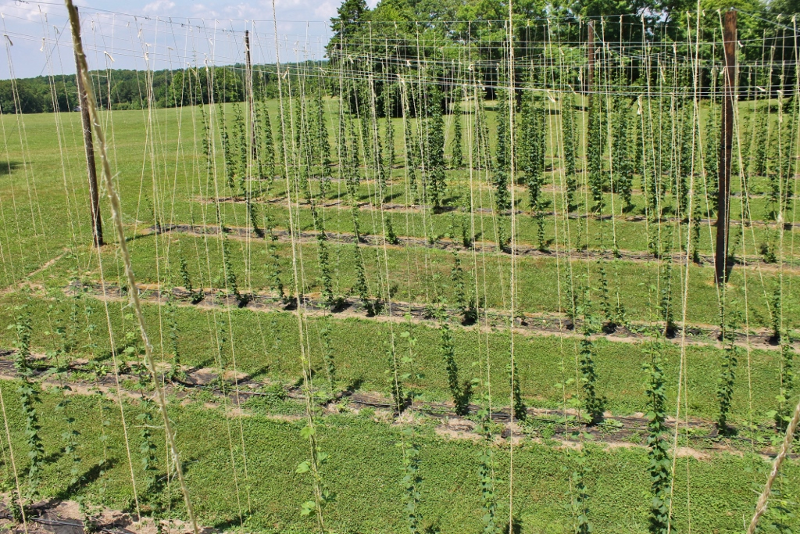
hops require poles and a network of twine, and a lot of labor to grow the vines on the trellis system and to harvest the flowers used to add spice to beer
Source: Virginia Co-Operative Extension blog, Meet Huguenot Hops (Again)

hops require poles and a network of twine, and a lot of labor to grow the vines on the trellis system and to harvest the flowers used to add spice to beer
Source: Virginia Co-Operative Extension blog, Meet Huguenot Hops (Again)
English colonists brought beer production to Virginia. In the 1600's, most households in Virginia brewed "small beer" from grain, molasses, hops and water. The boiling stage made local water safe to drink, and beer was the standard beverage at the dinner table. Men would drink 8-10 beers per day, but the low alcohol level and the very physical exercise minimized any alcoholic buzz.
The colonists flavored their small beer with the flowers from hops (Humulus lupulus); other spices could be added as well. The first hops were planted in Virginia by 1621.1
Modern craft beer is brewed to be distinctive. Creative mixutures of hops and local ingredients produce unique flavors not available in standardized, nationwide brands such as Bud Light that are intended to taste the same everywhere.
The flowers of two varieties of hop vines ae used today. Hops with a relatively low alpha acid percentage add aroma to beer, while varieties of hops with a relatively high alpha acid percentage add bitterness and an astringent taste.
IPA beers, such as Eight Point IPA from the Devil s Backbone craft brewery in Lexington, emphasize the bitter flavor and require use of additional hops in the brewing process. The bitter iso-alpha acids released by hops can be affected by sunlight and combine with other chemicals within beer, creating a "skunky" taste. Beer is often packaged in dark brown bottles to reduce the interaction of the hops with sunlight.2
Growing one or two hop vines would not add substantial workload for a hobby gardener, but a commercial-sized craft brewery needs a quantity of hops that requires creating a hopyard. Virginia is at the southern range for hops, which normally are grown between 35°-55° of latitude (primarily in the states of Washington and Oregon).
Many strains of hops have also been "privatized" by large beer-making companies. Craft brewers can not get access to those strains, and thus can not produce a local beer that mimics the flavor of a national brand. As one hop grower has noted:3
Hops are a high-value specialty crop, and not easy to grow on a commercial scale in Virginia. Current cultivars have been developed for the climate of the Pacific Northwest. They require 15 hours of sunlight/day, available in the long summer days at higher latitudes, to create flowers.
Portland, Oregon is north of the 45° line of latitude, while all of Virginia is south of the 40° line of latitude. The increased productivity in the Pacific Northwest, with yield of hops/acre as much as 3-10 times greater, gives growers there a substantial competitive advantage over hops growers in Virginia.
Global warming is threating the production of hops in Germany, the Czech Republic and Slovenia. Yields at hop farms are dropping and the concentration of the bitter compounds that flavor beer, alpha acids, are expected to decrease by over 20% by 2050. European governments do not allow use of genetically modified organisms (GMOs) in beer and soils at higher latitudes may not be suitable for growing the existing strains of hop plants, so the future of the European beer industry could be affected.4
Despite the economic contrasts, even growing 1-10 acres of hops could be a profitable farming operation in Virginia. Large national growers generate little profit from selling small quantities to small breweries, and Virginia craft breweries see a competitive advantage in advertising their beers are made from 100% locally-sourced materials. In addition, Virginia-grown hops can be sold and utilized while still fresh, but hops acquired from the Pacific Northwest will be dried and often pelletized before shipment.
"Wet hops" (fresh, undried, unpelletized flowers) sell at a premium to craft breweries looking to create a distinctive aromatic taste. Wet hops must be used quickly (typically within 24 hours) before they spoil and lose the aromatic oils.
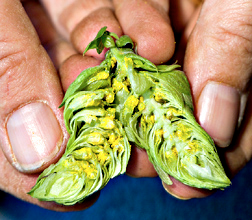
hop flowers produce acids that add bitter taste to beer and reduce microbial growth
Source: US Department of Agriculture, HOPS: New Markets, Better Storage
Converting wet hops into dry hops would allow Virginia hop growers to store and ship their crop to additional customers, but Pacific Northwest growers already dominate the dried hop market and drying would add extra cost that is not economic for small growing operations. The hop flowers must be dried at temperatures below 125° to avoid vaporizing those essential oils.
Few hop farms in Virginia have become profitable yet. As one grower noted:5
Growing hops on a large-scale for commercial operations requires expensive, specialized equipment. The vines grow up 15' high poles and across string/rope trellises, so workers use elevated equipment when harvesting hops.
Small-scale operations can not afford to invest heavily in specialized equipment used for only a few days/year. One option is for a community of hop growers to share equipment. An alternative is to develop a large hopyard to supply multiple breweries in the Mid-Atlantic market, with equipment to grow and to pelletize hops for storage and shipping. The opportunity to grow is clear - Washington state had 29,000 acres of hops in 2014, while Virginia had only 25 acres.6
In the Richmond area, the Huguenot Hops operation in Midlothian supplies breweries. In 2014, two hop growers in the Shenandoah Valley advertised for investors willing to finance $1.5 million for the poles and other infrastructure required to develop a large commercial operation.7
Centralized growing of hops will not result in centralization of the craft brewing industry in Virginia, but a large-scale hopyard would offer an opportunity to create a unique tourist destination. Location of the hopyard could be determined by local soils and micro-climate, but proximity to an interchange on I-81 or I-95 could also be a factor - if the hopyard is designed, like many Virginia wineries, to also generate income from tourists engaged in the "pursuit of hoppiness."8
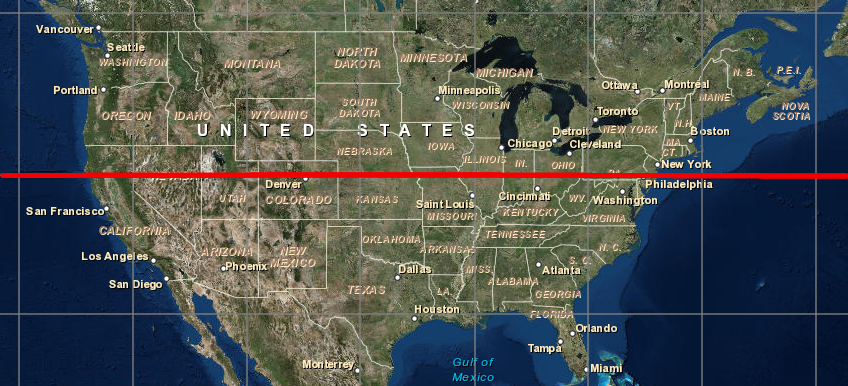
most hops are grown north of the 40th degree of latitude and dried before shipment to brewers, and cultivars grown in Virginia are less productive due to the reduced sunlight at the lower latitude
Source: ESRI, ArcGis Online
Hops are a botanical flavoring that can also be used in gin, as well as beer.
The Governor of Virginia announced in November, 2014 that the first commercial hops processing facility in the Mid-Atlantic region would be constructed at Black Hops Farm in Loudoun County, in part because of a $40,000 state grant from the Agriculture and Forestry Industries Development Fund. That $1 million facility will dry and pelletize hops to supply botanicals for Commonwealth Gin, which starting in 2014 was manufactured at the James River Distillery in Richmond and sold in the Virginia Department of Alcoholic Beverage Control (ABC) stores.
The hop processing facility will service local growers within a 50 mile radius, plus hops grown on 15 acres at the site in Lucketts. It is consistent with Loudoun County's Rural Economy Business Development Strategy goal to maintain a commercial agricultural base in that rapidly-suburbanizing county near Washington, DC.9
Wineries were already drawing tourists to Loudoun County, generating tax revenues while creating few demands on county services. The county was the first in Virginia to formalize regulations that authorized farm-based breweries on land growing hops.
Loudoun matched the $40,000 state grant to build the first regional hop processing facility in Virginia, and worked with the Virginia Cooperative Extension to build an online application with its local Geographic Information System to identify what properties would be most suitable for growing hops. One member of the Board of County Supervisors made clear that "location, location, location" was key to supporting Black Hops Farm and stimulating the agricultural component in the county's economic development plan:10
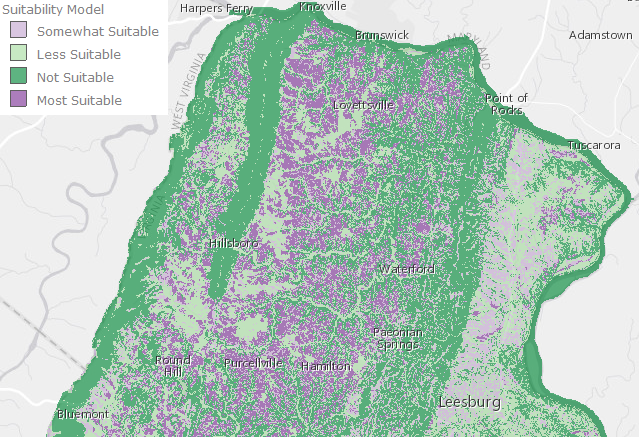
Loudoun built a computer-based model using information regarding soils, aspect, and slopes to identify where hop-growing would have the greatest potential
Source: Loudoun County, Suitability Model for Growing Hops
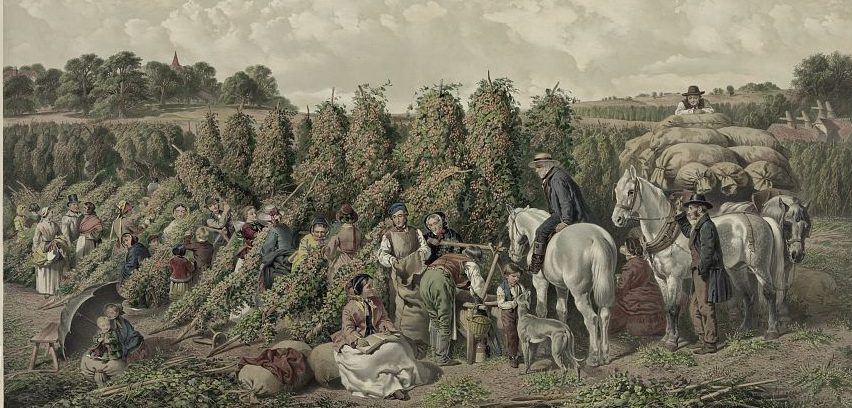
hops have been grown as an additive to beer for centuries
Source: Library of Congress, Hop-Picking